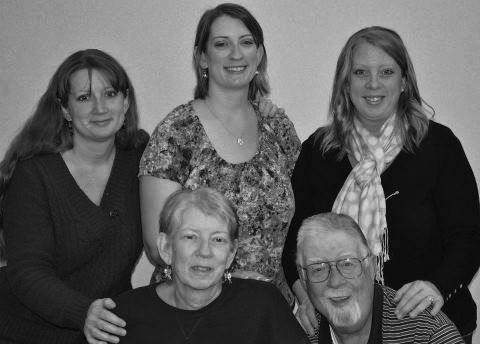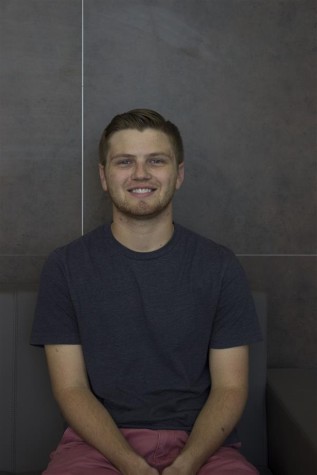A different kind of family

Security guard Walter Coates and his wife, Doris, pose with their daughters Michelle, Amber and Ivy last Christmas
It wasn’t just a typical dinner at the Whataburger in Decatur for security guard Walter Coates and his wife, Doris. The burger and fries may have tasted the same. The Styrofoam cup and orange accented interior of the restaurant hadn’t changed. The September weather was fairly standard. But a heavier topic lingered.
The recent diagnosis was weighing heavily on both of their minds. Cancer. One word. Six letters. Yet the sound brought utter devastation. It was a monster they had never faced before and one they hadn’t planned on facing either. But the fact of the matter remained. Doris had cancer in her liver, colon and left lung, and it wasn’t going away.
All of a sudden, a Hispanic man turned to ask the Coates what was wrong. He had overheard their conversation.
“I heard you are sick,” the man said. “What do you have?”
The couple explained Doris’ illness to him and his family. Before they knew it, a prayer group surrounded them in the middle of the restaurant. These complete strangers began praying in Spanish, a language neither Walter nor Doris could comprehend.
They sat in their chairs, the aroma of burgers and fries surrounding them, completely taken back. It was an odd sensation for the Coates. They didn’t know these people or what they were saying. But they knew that someone wanted to help.
***
Doris was first diagnosed in September. The couple of 40 years had recently moved to Denton from Vernon, a small town outside of Wichita Falls. Walter had taken a security job at the school in order to be closer to their grandchildren. He had only been at Marcus for a couple weeks when they found out.
It wasn’t just cancer. It was stage four cancer, the most advanced state of the illness.
Doris immediately started radiation and chemotherapy. However, chemotherapy was expensive, especially now that Doris couldn’t work. The heartbreaking medical problem soon became a financial dilemma as well.
“When you find out you have terminal cancer, there’s a whole lot of things you have to worry about,” Doris said. “One of them is: how can we afford treatment? We didn’t even have insurance for me.”
Just paying for groceries and electricity became a concern. So when Assistant Principal Erum Shahzad overheard Walter on the phone one day at work, distressed about his wife’s illness and their financial situation, she decided to do something about it. Shahzad immediately sent out a mass email to the faculty explaining the situation of one of their coworkers. Within 24 hours, over $1300 had been raised.
“It’s not surprising though because I’ve seen it,” Shahzad said. “I’ve been in this building for 17 years and even as a student, whenever there was someone was in need, we always came through.”
Walter’s situation hit home for Shahzad. When her son, sophomore Sami Shahzad, had open heart surgery years ago, the school raised thousands of dollars for him, too. She said that Walter is another member of the family at the school and that they always support each other.
“We always say Marcus family,” Shahzad said. “Anytime we need anything, we say Marcus family because we really do become a family.”
A few days later, Walter walked into the front office and was presented with roughly $1400 to go towards his wife’s cancer treatment. As he took the box filled with cash, filled with hope, tears began to flow from his eyes. He was so grateful. Yet he couldn’t find any words to say. Nothing could express the relief and gratitude he felt.
“We were pretty amazed,” Doris said. “And amazed just expresses it mildly.”
When Walter came home that day, he showed the money to Doris. Although she was still sick in bed, her eyes lit up.
“Do you know how far this will go for us?” she asked Walter.
The money that faculty raised, plus donations by students and parents, went toward providing basic needs that had become unaffordable and obtaining insurance for Doris. This would in turn help pay for her treatment.
Although she began undergoing treatment, it wasn’t the end of her battle with cancer. The illness was still ultimately terminal. As if that wasn’t bad enough, the side effects of the treatment kept her bedridden for months. Sometimes she felt so weak that she wouldn’t be able to get out of bed until Walter came home in the evening.
Recently, she said she has been feeling better. Although she said she is not through with the cancer and it is not through with her, Doris can now do everyday activities. She and Walter can even go out to a restaurant or to a movie.
“I really do feel like a person again for almost the first time in a year,” Doris said.
Although Doris doesn’t how much time she has left, she is making the most of it. She even made a trip to Lubbock recently to visit family. Despite all the trials and tribulations she has faced over the past months, Doris said that her faith in God has kept her going.
“I just fight with myself and ask all the time: why is this happening to me? What have I done?” Doris said. “The time came when I just felt this peace in my heart and felt like everything was going to be okay.”
Just when things seemed hopeless, students and faculty stepped up to the plate. In the same way that complete strangers prayed for them in Whataburger, students and faculty raised money for Doris’ cancer treatment. For just the short amount of time they have spent in the community, they said they have really embraced and been embraced by the students. If anyone asks Walter how many grandchildren he has, he will respond by saying, “Born into my family: 7, adopted: 3000+.”
“Once you’re at Marcus, you’re family,” Walter said. “Throughout the year I’ve been here in security, I have found out how great Marcus is.”
Whether it’s a friendly wave or just a smile, Walter has made it a point to greet everyone as they come into the parking lot every morning. Even with a wife at home with cancer, Walter finds a reason to smile every day.
“I guarantee you some of them maybe have had a rough morning or a rough night,” Walter said. “I’m probably one of the first people they see, and I want to have a positive attitude toward them so maybe they will have a better day.”
For someone like Doris, who graduated from a rural high school class of only twelve seniors, all of the hustle and bustle of a town of over 67,000 people like Flower Mound can be a bit much. She said she had always thought that good people were only in small towns. However, her battle with cancer and support she has received from complete strangers has changed her opinion.
“It has definitely turned my thinking around,” Doris said. “It’s not little towns where people are good and where people care. That can happen in any location.”
She said she has learned an important lesson from her battle with cancer and from Marcus students and faculty: friendly people can be found anywhere.
“I’ve always thought if you didn’t know your neighbor’s dog’s name, that wasn’t friendly people,” Doris said. “That’s not necessarily true. Friendly people are people that have a heart and those who care for others, especially if they are in need.”







